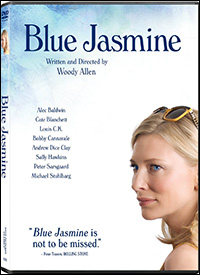
Director Robert Altman had already established himself with provocative hits (like the 1970 "M*A*S*H") when he came up with something new in 1975 with "Nashville" [Criterion]: A sociological epic drama featuring an ensemble cast of two dozen overlapping characters in mixed storylines that merge together, usually in well over two hours. "Nashville" is a country and western-infused tapestry of music, show biz, ego, hedonism, provincialism, political extremism, mental illness and assassination — all of which was very much on America's mind during the winding-down days of the Vietnam War.
Viewed from today, "Nashville" is certainly a nostalgic reminder of its period, with an emphasis on unseemliness. Altman and screenwriter Joan Tewkesbury were making a political statement back then, but watching the film 40 years later is like peering into a time capsule — an eerie time capsule, for some of us who lived in a decidedly different America.
"Nashville" is built around a fundraiser for a populist third-party candidate for the 1976 presidential election, which occurred a year after the film's release. (Jimmy Carter won.) The candidate is omnipresent — in the form of posters, placards and a campaign truck with blaring speakers — but unseen. Political operative Michael Murphy canvasses the town for headliners to appear in a major rally at Nashville's Parthenon, aided by Ned Beatty, husband of white gospel singing star Lily Tomlin. Prime catches are Opryland stars: Patriotic patriarch Henry Gibson; singing star Ronee Blakley, in between nervous breakdowns; singing star Karen Black, who hopes to supplant Blakley; Keith Carradine, a member of a Peter, Paul & Mary-like trio who, over the film's four-day span, sleeps with half the women; and Tomlin.
Also mixed up in the proceedings are talentless waitress Gwen Welles, who is forced to perform a striptease at a political function; Barbara Harris, an unfocused stranger who wanders into town looking for singing stardom, and, in the midst of the aforementioned assassination, finds it; Barbara Baxley, who waxes poetic on the Kennedy boys; and Geraldine Chaplin, an Englishwoman who stalks the streets with a cassette recorder purportedly making a documentary with the BBC. Non-music characters mixed up in it all include a young Scott Glenn, as a private on leave from the war; a young Jeff Goldblum, who enigmatically rides around town on an oversized tricycle in psychedelic garb; an old Keenan Wynn, who frets and fumes; and Shelley Duvall, a music groupie who is the cause of Wynn's fretting and fuming. And plenty more.
| |
 |
|
| Cover art |
*
Woody Allen has directed something like 46 movies over 46 years. His "golden age" — if you go for such terms — might be deemed to be back in the 1970s, with such items as "Sleeper," "Annie Hall" and "Manhattan." Of late, the septuagenarian has blossomed with 2011's delectable "Midnight in Paris" and last year's "Blue Jasmine" [Sony Pictures Classics]. Allen seems to have mixed up the tale of a character like Ruth Madoff (wife of you-know-who) with a character very much like Tennessee Williams' forlorn Blanche DuBois. If that sounds like a canny idea promising numerous delights, it is.
It's not the power of the idea that's important, but what you do with it. Happily, the director/author uses this Madoff/Streetcar mélange as a mere starting point. In lesser hands — and let's face it, most directorial hands are lesser than Allen's — this might have turned into a spoof with moments that hit and moments that miss. Allen takes this slightly borrowed idea and makes it his own, in his accustomed style. (The streetcar is still named desire, but it is now traversing the hills of San Francisco.) Everything he does, here, works; everything, even when it borders on farce, is handled perfectly. So yes, "Blue Jasmine" ranks high among the best of Allen.
As usual, the auteur fills his world with interesting actors. Cate Blanchett gives an awards-worthy performance as Blanche; that is, Jasmine. Sally Hawkins (as Jasmine's sister) and Bobby Cannavale (as the mechanic the sister lives with, and the Stanley Kowalski stand-in) offer strong support, as do Alec Baldwin (as the disgraced husband) and Peter Sarsgaard (as Jasmine's new catch). Allen also surprises us with an excellent performance from controversial stand-up comedian Andrew Dice Clay. But it is Blanchett — and Woody Allen — who make "Blue Jasmine" glimmer. (Steven Suskin is author of "Show Tunes," "The Sound of Broadway Music: A Book of Orchestrators and Orchestrations," "Second Act Trouble," the "Broadway Yearbook" series and the "Opening Night on Broadway" books. He also writes the Aisle View blog at The Huffington Post. He can be reached at [email protected].)









